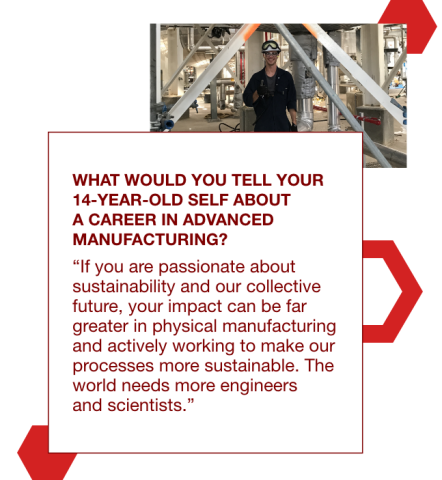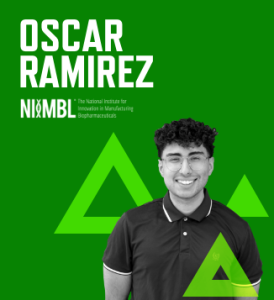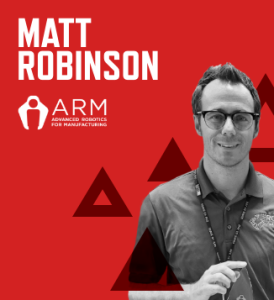
Innovation manager, sustainability collaborator, science advocate
Glenn Cormack is passionate about replacing the industrial smokestacks you see across many parts of America. Those smokestacks are part of traditional facilities that have been integral to manufacturing for generations. They are part of the process which heats and cools materials, processes materials in various chemical reactions, and then purges excess chemicals, gasses, or even byproducts. Replacing such well established technology is not going to be easy.
Glenn works for a company that has relied on these traditional industrial facilities. He is a Technical Fellow and Global Process Innovation Manager for The Lubrizol Corporation. Lubrizol provides essential specialty chemicals for the transportation, industrial, and consumer markets. These products include additives for engine oils, additives for industrial lubricants which help the machines used in manufacturing move smoothly and repeatedly, and additives for fuels such as gasoline and diesel.
Glenn is a past governing board chair of the Rapid Advancement in Process Intensification Deployment (RAPID) Institute, which is devoted to reducing industrial pollution and revamping how industry processes chemicals. RAPID, as part of the Manufacturing USA network, helps factories evolve from slower, batch-based production processes traditionally used to make chemicals to faster, more energy-efficient, and less wasteful continuous processes.
Glenn’s challenges include figuring out how to preserve what is good about existing industrial infrastructure through retrofitting old equipment. He also works to redesign processes to lower carbon emissions and transition to electric power sources, which are often cleaner than the fossil fuels that make those smokestacks necessary. He is also helping to figure out the most efficient and cost-effective way to design a chemical process. Glenn’s fixes could be improving an existing process or even developing a process from scratch that can be used widely in industry.
To explain chemical processing, Glenn uses the analogy of making soup. You add stock, veggies, and meat and let it simmer for a long time. His goal is to figure out how to make soup continuously without stopping, and by turning the gas as far down as possible to reduce energy consumption while recycling any water that evaporates.
Glenn recently led RAPID’s roadmapping panel on decarbonizing specialty chemicals for sectors such as agriculture or building materials. It’s an example of how Glenn has displayed a high level of leadership in solving manufacturing challenges – the essence of what makes him a Modern Maker.
Q&A with Glenn
How did you find your way to working in advanced manufacturing?
In 2014 I had the pleasure of being at the forefront of a new partnership between Lubrizol and the University of Pittsburgh Swanson School of Engineering. As part of this partnership, I became interested in “process intensification.” As this partnership grew, Lubrizol and Pitt both became engaged at the onset of RAPID, which included a flagship project in process intensification for one of Lubrizol’s additive products. The project was a commercial success and resulted in reductions of more than 60 percent in capital expense and more than 20 percent in energy intensity.


What is the most challenging part of your job?
The most challenging part of my role is funding. While that is far from science, fundraising is nevertheless a critical skill to develop to push the boundaries of technology.
What is the best part of your job?
The best part of my job is the people I get to work with. My core responsibility is innovation, but it is really the team that makes all of the success possible. At Lubrizol, I’m able to work with a huge cross-section of employees, from PhD synthetic chemists to engineers, welders, electricians, control technicians, supply chain professionals, finance partners, IP attorneys, and many more. As a Technical Fellow, part of my responsibility is being an ambassador for Lubrizol, spreading the good work that our teams are doing to make the world a healthier, more connected, and more sustainable place to live. I’ve had the pleasure of working with government officials, academics, and other professionals on how we can reduce our carbon footprint as an industry. The chemical industry is vital to the success of humanity, and through our work we can help make a difference to push it in a direction that helps all prosper.
What would people be surprised to learn about manufacturing or your role in it?
I have noticed that a lot of people now have a view that manufacturing, and in particular oil and gas and chemicals, should not be part of our human experience going forward. In some ways, we are deserving of this attitude because of horrible incidents that have occurred in the past 100 years. However, it is important to remember that chemicals have been largely responsible for many facets that we take for granted in our modern life: medicine, healthcare, basic transportation, communication, and beyond. Life before the modern chemical industry was hard. Why do I say this? The most important thing I can communicate to someone who is passionate about sustainability is to engage in physical manufacturing and actively work to make our processes more sustainable.
What makes you excited to go to work?
The most exciting part of my role is helping to mentor the next generation. I started at Lubrizol as a co-op student in my undergraduate program at The University of Akron. I eventually was hired full-time in process development and have gone on to supervise and mentor more than 30 co-op students in the past 15 years. Seeing a co-op student succeed in completing her first experiment or mastering his final presentation in front of senior leadership brings great satisfaction.
If you didn’t have to work, how would you spend your day?
I would apply to become a lecturer at a community college.
What activity gives you the most energy?

Starting up a new process unit, which inevitably won’t start until about 3 a.m.
What hobbies make you better at your career?
I grew up playing the cello and continued through college. I believe the balance between art and science helped me be a better engineer.
How does the work you do impact the world?
Lubrizol is the largest company you probably have never heard of. That said, the average U.S. citizen uses at least one Lubrizol product per day, and our fluids and materials are in 50 percent of vehicles across the globe. The products that I’m working to develop go into applications that are dramatically different, from shoes and apparel to drinking water pipes, pacemakers, catheters, refrigerators, transmission fluid, and refinery additives. I feel that I’m able to truly impact people’s lives and make sure that when we produce these materials, we do so in the least environmentally harmful way possible.




